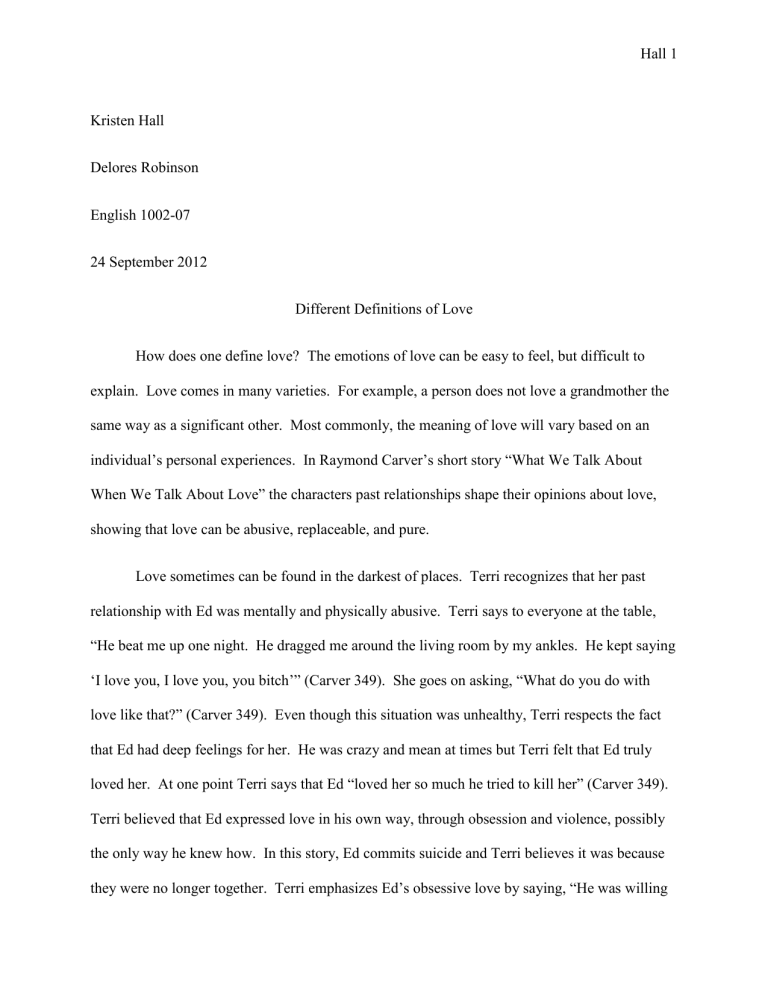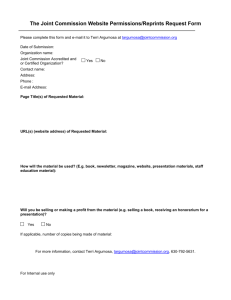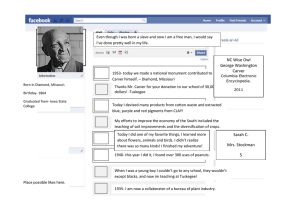
Hall 1 Kristen Hall Delores Robinson English 1002-07 24 September 2012 Different Definitions of Love How does one define love? The emotions of love can be easy to feel, but difficult to explain. Love comes in many varieties. For example, a person does not love a grandmother the same way as a significant other. Most commonly, the meaning of love will vary based on an individual’s personal experiences. In Raymond Carver’s short story “What We Talk About When We Talk About Love” the characters past relationships shape their opinions about love, showing that love can be abusive, replaceable, and pure. Love sometimes can be found in the darkest of places. Terri recognizes that her past relationship with Ed was mentally and physically abusive. Terri says to everyone at the table, “He beat me up one night. He dragged me around the living room by my ankles. He kept saying ‘I love you, I love you, you bitch’” (Carver 349). She goes on asking, “What do you do with love like that?” (Carver 349). Even though this situation was unhealthy, Terri respects the fact that Ed had deep feelings for her. He was crazy and mean at times but Terri felt that Ed truly loved her. At one point Terri says that Ed “loved her so much he tried to kill her” (Carver 349). Terri believed that Ed expressed love in his own way, through obsession and violence, possibly the only way he knew how. In this story, Ed commits suicide and Terri believes it was because they were no longer together. Terri emphasizes Ed’s obsessive love by saying, “He was willing Hall 2 to die for it. He did die for it” (Carver 352). Terri also appreciates that there are different ways to love. For example, Terri says in dialogue between her and Mel, “He didn’t love me the way you love me. I’m not saying that. But he loved me. You can grant me that, can’t you” (Carver 350). Terri understands that Ed’s kind of love was strange to most people, especially compared to her and Mel’s relationship, but Terri still credits Ed’s actions as his own kind of love (Carver 351). For some, love comes with an expiration date. Mel falls into this category because of his experience with his ex-wife, Marjorie. He states, “There was a time when I thought I loved my first wife more than life itself. But now I hate her guts” (Carver 352). To go from love to hate is an extreme change in emotion. This change could alter a person’s perception on relationships and love entirely. Throughout the story, Mel reflects on his relationship history: he fell in love, married Marjorie, divorced Marjorie, is now married to Terri and is in love again. Finding love a second time has given Mel the impression that love is replaceable. He say to everyone at the table, “All of this love we’re talking about, it would just be a memory. Maybe not even a memory” (Carver 352). He explains his opinion by stating that if anything were to happen to his current relationship he or Terri would find love again, replacing what is currently there (Carver 352). Mel’s outlook on love has given readers the impression that he does not experience deep emotion in his relationships. Without deep feeling or emotion it becomes easy to detach from a person to end a relationship, and just as easily begin a new one. Nick and Laura’s relationship appears to be intimate and pure. They do not share much of their own opinions of love. They do, however, express this emotion for each other openly with their interactions. In particular, Laura states that she and Nick know the true meaning of Hall 3 love and in response Nick makes a large production out of grabbing Laura’s hand and kissing it with deep unspoken meaning (Carver 351). The phrase “actions speak louder than words” closely relates to Nick and Laura. Rather than defining love with words, they show love with actions, such as kissing. Nick and Laura also actively show deep interest in Mel and Terri’s stories. While sitting at the table, Laura “glanced from Mel to Terri and waited with a look of bewilderment on her open face, as if amazed that such things happened to people you were friendly with” (Carver 350). The fact that these stories are so entertaining to them suggests that Nick and Laura’s previous relationships must have been respectively ordinary. The way Nick and Laura hold hands, kiss, and embrace each other’s presence is described as the “honeymooner’s stage” but could it also be that their experiences with love have not yet been tainted? By not experiencing the negative aspects of love or unhealthy relationships, their opinion on the subject is left innocent and undamaged. These examples of different opinions about love are just the tip of the iceberg. The various kinds of love to be shared are infinite. The denouement of this short story is that, diverse relationships a person experiences in life help to mold unique ideas of love. Terri’s past made her able to see the good in a bad situation. Her past also negatively affected her. Terri put herself in danger by reasoning that Ed cared and had good intentions. Mel’s reaction to past his relationship damages his present relationship. He is now incapable of having a relationship with deep meaning. Nick and Laura go unscathed by not having bad past relationships influence their current one. Whether a relationship is healthy, unhealthy, public, or private, a person will be affected from the experience, positively or negatively, ultimately creating a personal definition of love. Hall 4 Works Cited Carver, Raymond. “What We Talk About When We Talk About Love.” Literature and the Writing Process. 9th ed. Eds. Susan X. Day, Robert Funk, Elizabeth McMahan, and Linda S. Coleman. Upper Saddle River: Pearson, 2011. 348-356. Print.


